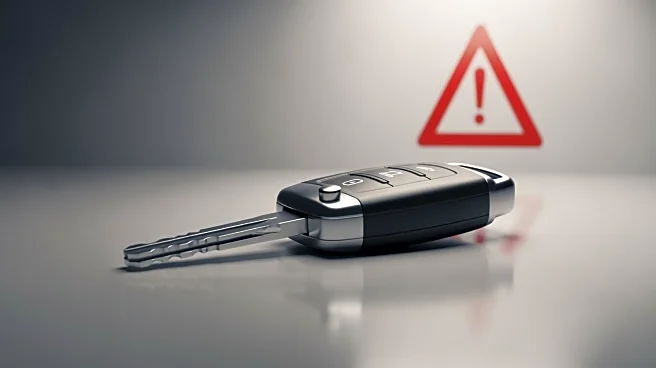What's Happening?
Ford has announced a recall of certain 2025 Bronco and Ranger models due to safety concerns. The recall involves issues with windshield bonding and airbag deployment. The windshield on some vehicles may not be properly bonded, posing a risk of detachment
during a crash, which could increase the risk of injury. This issue affects nine vehicles, and Ford plans to replace the windshields. Additionally, certain Ranger models have a defect in the instrument panel top cover that may prevent the passenger airbag from deploying correctly, increasing the risk of injury in a crash. This defect affects 405 vehicles, and Ford will replace the instrument panel assembly. Notification letters to owners are scheduled to be mailed in late October.
Why It's Important?
Vehicle recalls are critical for ensuring consumer safety and maintaining trust in automotive brands. The defects identified in Ford's Bronco and Ranger models could lead to serious injuries if not addressed, highlighting the importance of compliance with Federal Motor Vehicle Safety Standards. Recalls can have significant financial implications for manufacturers due to repair costs and potential legal liabilities. They also impact consumer confidence, which can affect sales and brand reputation. Ford's proactive approach in addressing these issues is crucial to mitigate risks and reassure customers of their commitment to safety.
What's Next?
Ford will begin notifying affected vehicle owners through mailed letters, with interim notifications expected by October 24. The company will provide additional communication once a final remedy is available. Owners are encouraged to contact Ford customer service for more information and to schedule necessary repairs. The automotive industry will be closely monitoring Ford's handling of this recall, as it may influence regulatory scrutiny and consumer perceptions of vehicle safety standards.
Beyond the Headlines
This recall underscores the ongoing challenges faced by automakers in ensuring vehicle safety amidst complex manufacturing processes. It highlights the importance of rigorous quality control and compliance with safety standards. The incident may prompt other manufacturers to review their safety protocols to prevent similar issues, potentially leading to industry-wide improvements in vehicle safety and manufacturing practices.















